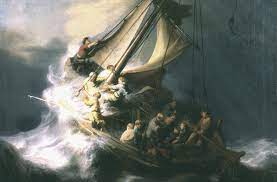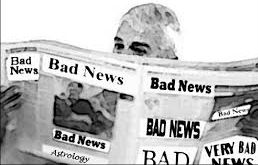Thirty-Second Sunday in Ordinary Time
“Lord, Lord, open the door for us.” Mt. 25: 12
John Allen, a renowned Catholic journalist, claims that whenever he speaks to a church audience these days, he tells this joke:
“A dad is sitting in his living room when he hears a ruckus upstairs. He goes up and is startled to see the kids sitting in a circle of folding chairs, screaming their lungs out at each other: ‘You’re an idiot!’ says one of the kids. ‘You’re completely wrong and I can prove it!’ says still another. And on it goes like this around the circle. The father finally has had enough. So he steps in and demands to know, ‘What in the world is going on here?’ “Oh, don’t worry, dad,’ one of the kids says. ‘We’re just playin’ church.’”
This past month marked the five-hundredth anniversary of Martin Luther hammering his Ninety-five Theses to the doors of the Castle Church in Wittenburg, Germany. The Theses split the thousand-year-old Roman Catholic Church into two churches – one loyal to the Pope in Rome, the other protesting the Pope’s rule. The latter becoming known as Protestant.
According to historians, however, the hammering of the Theses never actually occurred. Instead, Luther had sent them via letter to the local archbishop.
Regardless, the Reformation had begun.
History was radically changed.
And soon thereafter, alternative churches arose in one place after another. Today, an eighth of the human race is Protestant.
Some historians have argued that Luther’s actions led to what we now call “modernity.” The ideas of pluralism, religious liberty, and self-government all entered history, historians say, through the door that Luther opened.
From a theological standpoint, the two most important beliefs that guided Luther were “sola fide” (by faith alone) – the conviction that faith, as opposed to works, is the sole basis for salvation, and “sola scriptura” (by scripture alone), the conviction that only the Bible could tell us the truth.
As one historian explains, “Luther was born only a few decades after the invention of printing …. In the first half of the sixteenth century, a third of all books published in German were written by him …. More people wanted to read, and the more they knew how to read the more they wanted to own this book: the Bible.”
As a consequence, the Christian world has been split for some 500 hundred years. The good news in our lifetime is that the Catholic Church and most of the mainline Protestant churches have reached agreement on many of the most pressing issues dividing them, and a sense of healing now dominates.
The pointless bickering common to the experience of many of us in our youth, and joked about in John Allen’s story, has been largely put aside. In its place is a common concern for showing respect and together committing ourselves to living out the Way Jesus asks of us – especially in our common cause to feed and heal and reach out in love and service to those who are unable to fend for themselves.
This is the “door” that today’s gospel refers to. This is the “door” that will allow us – together – to demonstrate our common respect and passionate desire to help cure what is dividing our country, to help heal what is hurting in our hearts, and to help revive the zeal needed to embrace the urgent gospel message that calls us to see with different eyes, to walk a new path, to develop a whole new value system.
And to do all of this together.
Sacred Scripture is now central to both sides of the divide. Faith and works is now deemed to be the goal for everyone calling themselves Christian. Following Jesus’ call to discipleship is recognized by all as the ultimate challenge – not the rituals or the language we so ardently fought about for so long.
Instead, we now commonly recognize that the “door” has been opened, our eyes have been opened, our hearts have been opened.
Now we can joyfully pray together with today’s gospel:
“Lord, Lord, open the door for us.”
Ted Wolgamot, Psy.D.
11809194.1
11/10/17




